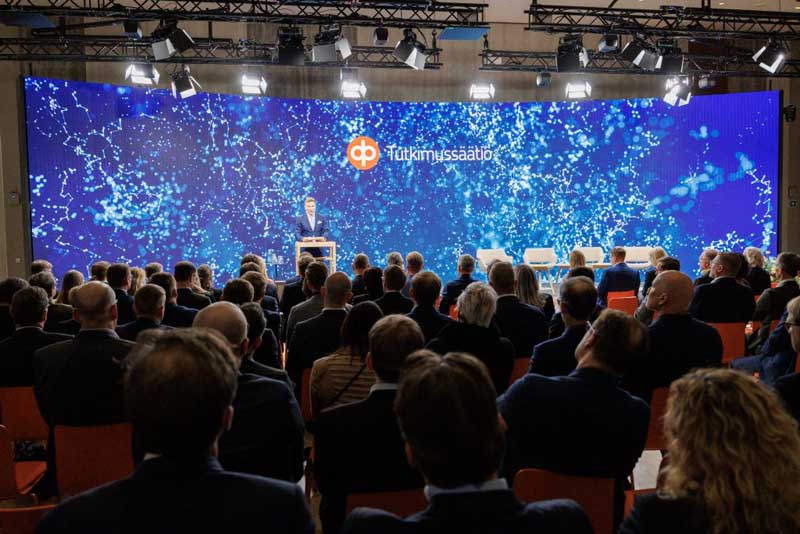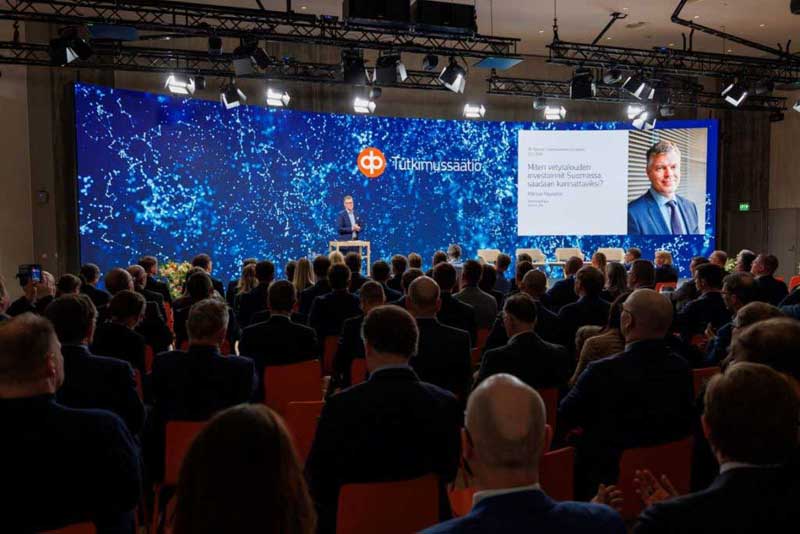25.1.2024
Held for the 35th time, the topics of this year's theme day included the hydrogen economy and the possibilities it brings to Finland. Combatting climate change requires a significant reduction in emissions, and hydrogen can be seen as one of the key steps towards net zero emissions – or at least as one alternative if the market develops positively.
The potential of hydrogen is clear, but uncertainty poses additional risks
The transition towards clean and efficient energy speeds up the electrification of society, but not everything can be made electric. This situation creates an interesting potential market for hydrogen in order to achieve net zero emissions targets. However, many challenges still need to be solved for Finland to become one of the world's leading hydrogen economies.

This year's theme day was opened by President and Group CEO Timo Ritakallio, who noted in his speech that while both information on the one hand and inaccurate and false information on the other are available in great quantities today, it is especially important to support science and research to ensure that accurate and researched information is available to as many people as possible.

"Finland is in an excellent position in many ways to become a hydrogen superpower, if hydrogen is the technology of the future. The hydrogen economy is a means to an end in building Finland into an economy that is based around clean energy, and we have the prerequisites to achieve this," said Minister of Climate and the Environment Kai Mykkänen in his speech at the Theme Day.
While several challenges remain unsolved in the road to a hydrogen economy, the potential is also clear.
"We have several advantages in terms of a prospective hydrogen economy: we have access to clean, affordable electricity, our power grid is in good shape, we have the space needed for investments and a more seamless permit process than Sweden, for example. With these strengths, we are able to attract investments to Finland," added Mykkänen.

Markus Rauramo, CEO of Fortum, agreed and noted that countries that possess the same kinds of advantages as the Nordics are rare even on a global scale. Because of this, Finland has excellent potential to increase its role in the hydrogen economy. Rauramo advised the audience that if the climate targets of the Paris Agreement were to be reached, the demand for electricity would double. This is a huge leap and a potential area where Finland can grow.
"We are already able to tell interested parties that we have nuclear power and flexible hydropower. We can also say that we have investment plans, a process that is positive towards nuclear power, and all the necessary elements in place. The potential of hydrogen is immense and obvious," said Rauramo.
At the same time, the uncertainties involved with hydrogen are great.
"For the moment, we lack the infrastructure, markets and industrial-scale capabilities. We don't know who will bear the manufacturing and construction risks and who will assume the risk related to the price of hydrogen and electricity. Financing is still hard to come by," Rauramo said.
As the obvious risks of hydrogen must be manageable, Rauramo proposes four components for a solution: an active public sector to build the market for hydrogen, reducing financing risks with price subsidies, for example, guarantees during construction, and predictable and transparent regulation. Ultimately, what is also needed are paying customers.

OP's Recognition Award was granted to Kristiina Huttunen, Professor at Aalto University and VATT for her research on labour economics and family economics using Nordic and Finnish micro data, as well as for her pioneering studies on the economics of crime in Finland.

The doctoral thesis award for the academic year 2022–2023 was granted to Mikko Kauppila from the University of Oulu for his dissertation titled "Whither alpha? Hedge fund performance in voluntary versus regulatory datasets”. The dissertation examines the returns of hedge funds and their performance with insightful analysis and demonstrates, among other findings, that the choice of datasets significantly impacts the conclusions that can be drawn on the performance of hedge funds. The dissertation's strengths also include the versatility of the analysis.

In the panel discussion, when asked whether the discourse on hydrogen is starting to resemble hype, Professor Katriina Honkala from the University of Jyväskylä responded that as hydrogen is already widely used, the current hype has more to do with a change in the way hydrogen is used and produced, whether from fossil fuels or through clean methods without CO2 emissions. There is also a desire to expand the potential applications of hydrogen.
"Hydrogen has a major role in the transition to clean energy. The hydrogen market is interesting because we need different alternatives alongside electrification," said Kari Levoranta, COO and Partner at P2X Solutions, a pioneer of green hydrogen in Finland, at the panel discussion held as part of OP Financial Group Research Foundation's Theme Day.
Professor Jero Ahola from LUT University predicted that the entire energy system would be rebuilt during the next few decades, presenting enormous business opportunities for companies.
Photos: Aleksi Humalainen
